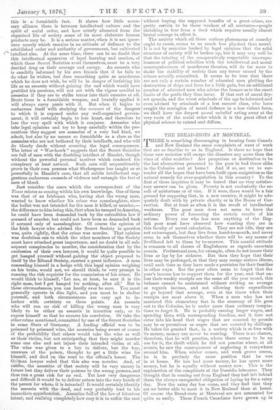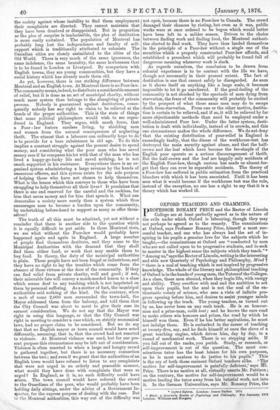THE BREAD-RIOTS AT MONTREAL.
THERE is something discouraging in hearing from Canada and New Zealand the same complaints of want of work that are so familiar to us in England. Is there no hope that these new societies will escape the disasters any more than the vices of older societies? Are pauperism or destitution to be the last alternatives presented to the poor in bad times alike in the Colonies and at home And if so, are we to sur- render all the hopes that have been built upon emigration as the natural remedy for over-population in this country ? To the first of these inquiries it may be feared that no very satisfac- tory answer can be given. Poverty is not exclusively the re- sult of misfortune or of vice. If it were, there would be a fair ground for supposing that, in a, new country, it might be ade- quately dealt with by private .charity or in the House of Cor- rection. But at least as often it is the result of intellectual weakness. The poor man does not seem to have the ordinary power of foreseeing the certain results of his actions. Every one who has seen anything of the Eng- lish poor must have observed how wanting they are in this faculty of moral calculation. They are not idle, they are not extravagant, but they live from hand-to-mouth, and never seem to ask themselves whether there will be any means of livelihood left to them by to-morrow. This mental attitude is common to all classes of Englishmen as regards uncertain events. Professional men, for example, often do not insure their lives or lay by for sickness. But then they hope thet their lives may be prolonged, or that they may escape serious illness, until such time as they have made a provision for their families in other ways. But the poor often seem to forget 'that the year's income has to support them for the year, and that un- less their weekly receipts are the same all the year round, this balance cannot be maintained without striking an average as regards income, and not allowing their expenditure to go beyond that average, even at the times when their receipts are most above it. When a man who has not mastered this elementary fact in the economy of life goal out to the Colonies, he is under more than ordinary tenipta- tions to forget it. He is probably earning larger wages, and spending them with corresponding freedom, and it does not enter into his head that wages that are counted by pounds may be as precarious as wages that are counted by shillings. He takes for granted that, in a society which is so free with its money, money can never be wanting. There is no chance, therefore, that he will practise, where there seems to be no use for it, the thrift which he did not practise where, at all events, he saw the consequences of neglecting it everywhere around him. When winter comes, and work grows sCarce, he is in predisely the same position that he was in at home. He has had more money, he has spent more money, but he is equally without money now. This is the explanation of the complaints of the Dunedin labourers. They thought that in coming out from England they had left behind them the always unregarded obligation of laying by for a rainy day. Now the rainy day has come, and' they find that they are no better able to meet it in New Zealand than at home. Of course the Bread-riots at Montreal are not attounted for quite so easily. These French Canadians have grown up in
the society against whose inability to find them employment their complaints are directed. They cannot maintain that they have been deceived or disappointed. But in proportion as the plea of surprise is inadmissible, the plea of destitution is more easily sustained. The population of Montreal has probably long lost the independence and faculty of self- support which is traditionally attributed to colonists. The Canadian cities are closely assimilated to the cities of the Old World. There is very much of the same ignorance, the same indolence, the same brutality, the same lawlessness that is to be found in London or Liverpool. By comparison with English towns, they are young communities, but they have a social history which has already made them old.
As yet, however, there is one striking difference between Montreal and an English town. At Montreal there is no Poor-law.
The community seems, indeed, to distribute a considerable amount of relief, but it is done as an act of municipal charity, without much more system than belongs to the almsgiving of private persons. Nobody is guaranteed against destitution, conse- quently nobody has any right to claim to be relieved at the hands of the proper authorities. This is the state of things that some political philosophers would wish to see repro- duced in England. They argue, with much force, that a Poor - law fosters careless living, by shielding men and women from the natural consequences of neglecting
thrift. The utmost that a labourer can ordinarily hope to do is to provide for a bare subsistence in old age. To do this
implies a constant struggle against the present desire to spend money, and considering what the poor man who has saved money sees if he compares his lot with that of the man who has lived a happy-go-lucky life and saved nothing, he is not much supported in his resistance. Everywhere there is an or- ganised system administering a large revenue by the hands of numerous officers, and this system exists for the sole purpose of helping those who have not chosen to help themselves. What is the lesson which this conveys to those who have been struggling to help themselves all their lives ? It proclaims that there is one end reserved for the careful and the reckless, for him that saves money and for him that spends it. What can demoralise a society more surely than a system which thus encourages men to become a burden upon the community, by undertaking before-hand to support as many as offer them- selves?
The truth of all this must be admitted, yet not without a reminder that there is another side to the question which it is equally difficult to put aside. In these Montreal riots, we see what without the Poor-law would probably have happened again and again in England. A large number of people find themselves destitute, and they come to the Municipal Authorities with the demand that they shall find them either food, or work that may enable them to buy food. In theory, the duty of the municipal authorities is plain. These people have not been frugal or industrious, and they have no right to lay the troubles which come from the absence of these virtues at the door of the community. If they can find relief from private charity, well and good ; if not, their miserable fate will convey a much-needed lesson to a class which seems deaf to any teaching which is not imprinted on them by personal suffering. As a matter of fact, the municipal authorities said nothing of the kind. On the contrary, when a- mob of some 2,000 men surrounded the town-hall, the Mayor addressed them from the balcony, and told them that the City Council was about to meet to give their case its earnest consideration. We do not say that the Mayor was right in using this language, or that the City Council was right in meeting to consider a case which, on strictly economical laws, had no proper claim to be considered. But we do say that that no English mayor or town council would have acted differently, assuming, that is, that the crowd had not resorted to violence. At Montreal violence was used, but for our pre- sent purpose this circumstance may be left out of consideration. Violence is often resorted to when a large and hungry crowd is gathered together, but there is no necessary connection between the two ; and even if we grant that the authorities of an English town would have refused to listen to any complaints that were not urged in an orderly and peaceable manner, what would they have done with complaints that were so urged ? In England, as it is, no such difficulty could have arisen. The town council would have referred the crowd to the Guardians of the poor, who would probably have been holding daily sittings, under the advice of a Government In- spector, for the express purpose of dealing with the case. But to the Montreal authorities, this way out of the difficulty was
not open, because there is no Poor-law in Canada. The crowd damaged their chances by rioting, but even as it was, public works were at once ordered to be begun which would better have been left to a milder season. Driven to the choice between finding work and finding food, the Montreal authori- ties elected to find work. They have thus landed themselves in the principle of a Poor-law without a single one of the securities which a properly constructed Poor-law affords, and established a precedent which will probably be found full of dangerous meaning whenever work is slack.
As regards ourselves, the conclusion to be drawn from colonial experience is to be content with the ills we have, though not necessarily in their present extent. The fact of destitution is one that cannot safely be disregarded. As soon as it shows itself on anything like a large scale, it becomes impossible to let it go unrelieved. If the good-feeling of the community is not shocked by the spectacle of men dying from starvation, the fears of the community will probably be excited by the prospect of what these same men may do to escape death from starvation. From one or the other motive, destitu- tion is certain to be relieved, and if so, it will be relieved by far more objectionable methods than need be employed under a well-administered Poor law. Under the latter system, desti- tution is dealt with individually, instead of in crowds, and this one circumstance makes the whole difference. We do not deny that the existing distribution of poor-relief in England is exceedingly faulty, that the disuse of the workhouse-test has destroyed the main security against abuse, and that the half- crown and the loaf which have become the fee-simple of the English poor operate as a serious discouragement of thrift. But the half-crown and the loaf are happily only accidents of the English Poor-law, though custom has made us almost for- get that they can ever be separable accidents. The theory of a Poor-law has suffered in public estimation from the practical blunders with which it has been associated. Until it has been seen what it would become if the workhouse test was the rule, instead of the exception, no one has a right to say that it is a theory which has worked ill.



































 Previous page
Previous page